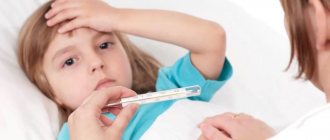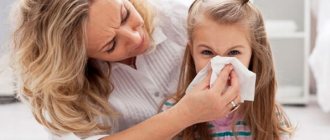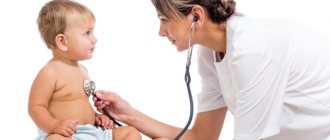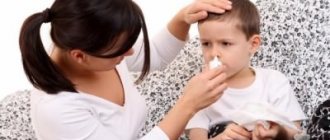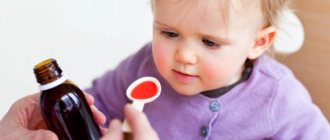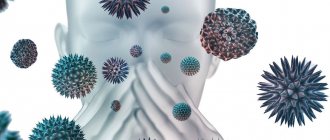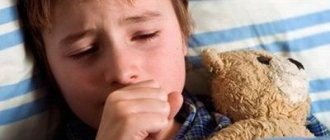Allergic cough is a fairly common phenomenon, often occurring in children who suffer from diathesis in infancy. Such a child may develop a cough even with a small amount of allergen.
Allergic cough - dry, barking. In this case, it is not accompanied by sputum production, as with a cold, for example. Before the attack begins, the child may complain of breathing problems or lack of air. This sign signals the onset of a mild degree of suffocation, which occurs due to swelling of the mucous membrane of the bronchi and larynx. What to do if a child has a similar symptom?
Causes
An allergen can be any substance. Coughing is caused in most cases by substances that may be contained in the inhaled air. They enter the body in various ways. How does an allergic cough occur?
Under normal conditions, the immune system of a healthy person reacts aggressively only to bacteria, microbes and other dangerous microorganisms and substances. But an allergic person’s immunity works differently: it reacts even to harmless external factors, such as:
- Dust;
- Sunlight;
- Animal wool;
- Various smells, especially flowers, perfumes, pollen.
This causes various manifestations, which are commonly called today an allergic reaction of the body.
The main factors that increase the risk of allergies and allergic cough can be identified:
- Hygiene. There is an opinion that with the development of progress, people's passion for cleanliness has increased. We stopped contacting many allergenic factors, as a result, our immune system weakened and began to perceive them as some kind of danger.
- Antibiotics. It is known that the use of antibiotics during pregnancy and in the first year of a child’s life increases the risk of allergies.
- Chemistry. Additives and chemicals are strong allergens. In addition, they disrupt the endocrine system and increase the susceptibility to the development of allergic reactions.
The main allergens that can cause a severe reaction include:
- Some foods, especially nuts, honey, dairy products.
- Dust (book, house dust).
- Pet hair, bird feathers, fluff.
- Mushrooms, fungal spores.
- Medicines (absolutely any medicine can cause an allergic reaction).
- Pollen of any plants: cultivated, weed, medicinal.
- Insect poison (wasps, bees, mosquitoes).
- Chemicals and additives.
Causes
Vasomotor rhinitis occurs for the following reasons:
- flowering of plants or trees;
- animal hair, bird fluff;
- essential oils, chemical compounds;
- taking medications;
- inhalation of dust;
- too high or low air humidity;
- heat or cold;
- food products;
- fallen autumn leaves;
- runny nose due to nervousness, mainly a reaction to events that cause strong emotional stress;
- exceeding the concentration of ultraviolet radiation.
It is extremely rare to have an allergy to several types of plants, when a runny nose occurs only when they are combined. The symptoms resemble sinusitis, but the nasal discharge is almost clear. Profuse lacrimation, severe redness of the eyes, nausea, headaches interspersed with loss of consciousness. Mostly diagnosed as a disease of unknown etiology. It is extremely difficult to cure, since therapy is prescribed as for sinusitis of an infectious nature. Only a good ENT can make a correct diagnosis for such symptoms.

Possible diseases
A dry, obsessive allergic cough in a child may be accompanied by respiratory failure. If contact with the allergen continues for a long time, complications are possible in the future, such as:
- Obstructive bronchitis;
- Tracheobronchitis;
- Bronchial asthma;
- Hay fever;
- Allergic bronchitis;
- Allergic tracheitis;
- Allergic rhinitis.
Any child’s complaints about difficulty breathing should alert parents, since in such a case the cough may result in an attack of suffocation. The pediatrician must know about this and prescribe additional examination and consultation with specialists.
Forms of the disease
I distinguish several forms of pathology:
- Atopic – rapid course of the disease, pronounced symptoms.
- Obstructive is a dangerous disease, since inflammation seizes the larynx and provokes its swelling. Young patients may develop asphyxia, which negatively affects the entire body.
- Allergic tracheobronchitis - an inflammatory process affecting the trachea and bronchi.
- Infectious-allergic bronchitis is a blurred picture, so it is difficult to accurately diagnose. The course of the disease is protracted.
Treatment
Medication
Cough due to allergies in children is treated by eliminating the allergen. Drug treatment in this case, alas, is only an auxiliary method. During the examination, it is important for the attending physician to evaluate the child’s lifestyle, nutrition, living conditions, environmental conditions, air parameters, and the quality of hygiene products.
Unfortunately, it is not yet possible to completely cure allergies. Modern medicine is not able to change the internal processes of the body to such an extent that it stops responding to the allergen.
Allergy treatment includes 2 main aspects:
- Limiting contact with allergens;
- Taking antihistamines.
Antihistamines help relieve allergy symptoms, including swelling, ease breathing, and eliminate cough. There are no other ways to relieve swelling of the larynx due to allergies.
Some allergy medications cause drowsiness and lethargy in children and adults.
Below is a list of medications that act for a long time and have no side effects:
- Loratadine. This drug acts within 24 hours, so children under 12 years of age are usually given half a tablet per day. Loratadine is not addictive and has no side effects.
- Cetrin. For children, this medicine is available in syrup form. It can be given to children from 2 years of age. The drug relieves cough, itching, swelling, and relieves rhinitis. However, in some cases, drowsiness may occur.
- Fenkarol. The medicine is produced in a special form for children over 3 years of age. It is prescribed to children 1-3 times a day, depending on the severity of the allergy and the age of the child. The drug has virtually no side effects.
- Tavegil. This remedy can be given to children after 1 year in the form of syrup or injections. However, it is necessary to take into account that the drug has a number of side effects, so it must be handled with caution and avoided overdose.
- Suprastin. The most famous remedy for allergies, suprastin, can be offered to a child in the form of tablets. There are also injections. The tablet must be ground into powder and diluted with water. Children do not like this medicine because it is bitter. Side effects include drowsiness and dizziness.
- Diazolin. These tablets can be given to children from 3 years of age. Please note that they may have some side effects: irritability, sleep disturbance.
- Zyrtec. Pediatricians like to prescribe this drug, since it practically does not cause adverse reactions and acts almost immediately and for a long time. For children it is available in the form of drops. Children's Zyrtec can be given to children from 6 months.
If the cough takes on a different form and develops into a long-lasting dry cough, then you should resort to the use of expectorants.
Do not unjustifiably prescribe glucocortecosteroids to your baby. This is a dangerous hormone therapy that can make him dependent on it for many years. In severe cases, ask your doctor to limit himself to drip infusions of glucose and physical solution in the first stages. This will achieve a minimum concentration of allergens in the baby’s blood and reduce allergy symptoms.
Folk remedies
When treating allergic cough in children, it is not recommended to use folk remedies. They are not only ineffective, but can be dangerous to the life and health of the baby. And adults who have allergic reactions should not use folk remedies to relieve symptoms. This can significantly worsen the condition and cause another attack of suffocation.
Inhalations for allergic coughs can be considered effective methods. Also, attacks of painful cough can be relieved by steam inhalation over boiled potatoes.
Treatment of wet allergic cough
Therapy for wet cough is complex:
- Do not let the baby come into contact with the irritant.
- Use medications.
- Apply therapeutic measures.
- Immunotherapy.
- Normalize your diet.
Drug treatment of wet allergic cough:
- Antihistamines. Preference should be given to the latest generation of drugs, since they have a minimum of contraindications and side effects.
- Enterosorbents are prescribed for intoxication of the body. The drugs help remove toxins and allergens.
- Bronchodilator medications (inhalers) – help relieve swelling from the laryngeal mucosa and make breathing easier.
- Expectorants that quickly remove mucus.
- Antileukotriene drugs - eliminate bronchospasm and increase mucus production.
Effective physiotherapy techniques for wet allergic cough:
- Hypoxic therapy - a sick baby inhales special air.
- Halotherapy - the child is placed in an artificially created salt climate.
- UHF irradiation helps eliminate the inflammatory process, improves immunity and improves the general well-being of the patient.
- Ultraviolet irradiation - eliminates the inflammatory process.
ASIT – allergy-specific immunotherapy. The method helps to achieve immunity to the allergen, but the process takes a lot of time and is carried out during remission. The idea is to take microscopic doses of the allergen.
Prevention
If your child is diagnosed with an allergy, protect him from contact with external factors that provoke a coughing attack. Also make sure that allergens do not accumulate at home, especially in the room where the child spends most of his time.
Inhalation with nebulizer for cough in children
Recipes for solutions for inhalation with a nebulizer for a runny nose are described in this article.
How to calm a night cough in an adult //drlor.online/diagnostika-lechenie/kashel/nochnoj-u-vzroslyx-prichiny-i-sposoby.html
To do this, take the following measures:
- Wet clean your home regularly. Remove all dust from under beds and closets, and in corners.
- Choose smooth wallpaper to prevent dust from collecting in the folds.
- Do not hang heavy curtains: they collect dust and dirt. If you have blinds, wipe them regularly with a damp cloth.
- If you are allergic to pollen, it is not recommended to open windows; You can ventilate the room using a split system and special filters.
- Children with allergies should not play with soft toys. They collect a lot of dust, mites, insects, and larvae. You shouldn't even keep such toys in the house. For such children, buy wooden, plastic, and rubber toys made of high-quality materials without strong odors of paint and chemicals.
- If your cough gets worse at night, replace down pillows and blankets with synthetic ones.
- Make sure that all cosmetics and household chemicals that the child comes into contact with are hypoallergenic, without dyes or flavors.
- Carpets and books also collect dust a lot. It is better to get rid of carpets altogether. If the floor is cold, you can buy a washable folding floor at any children's store. Books should be stored outside the children's room and only in a closed cabinet. They need to be wiped periodically.
- Sometimes indoor plants and pots with soil become the cause of allergies. Remove them from the children's room, and if necessary, get rid of them altogether.
The best prevention of allergies in a child is considered to be prevention during pregnancy. Try not to eat allergenic foods, and take more walks in the fresh air when your pollen allergy does not worsen.
Allergic cough, symptoms in children of dry or wet cough
A child’s body often reacts unexpectedly to many irritants, and allergic manifestations can bring a lot of trouble to the baby. Among the alarming signals that appear due to irritating factors are severe and prolonged coughing attacks. How to correctly recognize an allergic cough, symptoms in children, and how to carry out effective treatment?
Dry allergic cough and its main causes
How to correctly identify a dry allergic cough and what can trigger its occurrence? Usually there can be many reasons for such an unpleasant sign:
- treatment with aggressive powerful drugs;
- use of antibacterial drugs;
- dry and polluted indoor air;
- chemical-based food products (dyes, flavors, preservatives, flavor enhancers).
How to recognize an allergic cough, symptoms in children, the main methods of dealing with this manifestation - these questions often worry parents who are faced with the problem for the first time.
First of all, it is not difficult to recognize this sign - it appears suddenly, for no apparent reason.
Sputum is practically not expectorated, which brings considerable discomfort to the child - attacks can cause nausea or even severe vomiting.
Cough attacks are often associated with colds, but you should pay attention to additional symptoms - if there is no fever, runny nose, or irritation in the throat, most likely the baby is suffering from allergies. You can verify this only with the help of a doctor, whom you need to contact immediately. A specialist will not only determine what exactly provoked this unpleasant symptom, but will also help get rid of it.
Wet allergic cough - signs, causes
It often happens that, for unknown reasons, a child is bothered by a wet allergic cough, which is no less dangerous than a dry one. Parents do not need to try to independently determine the causes of its manifestation - only an immediate visit to a doctor will help to understand what factors provoked this symptom.
The main symptom of an allergy is severe coughing attacks with copious sputum production. If the irritant is not identified in a timely manner and is not eliminated immediately, the child may begin to experience vomiting, dizziness, and pain in the chest and abdomen.
How to properly treat an allergic cough, symptoms in children, main allergens - all this must be clarified during a visit to the doctor. The following irritants can cause such an alarming manifestation:
- contact with animals;
- household chemicals (washing powder, detergent);
- plant pollen;
- house dust.
Only after eliminating the allergen can you begin treatment, and you need to remember that not all antitussive drugs will help cope with the problem - complex treatment is often required.
The main symptoms of allergic cough in children
Quite often it happens that parents do not even pay attention to coughing attacks, believing that this is a harmless sign of a cold. The treatment used here is appropriate - they give the child simple cough medications. This is a considerable mistake - they only aggravate the situation, because everything should start with eliminating the irritant.
In order not to confuse an allergic cough with cold symptoms, it is necessary to know the symptoms of this complication in children. The most basic signs are:
- coughing attacks that last for several weeks;
- no other signs of the disease are observed;
- the child develops watery eyes, irritation in the throat and sinuses;
- a runny nose begins, the baby often sneezes;
- clear, viscous sputum is produced.
If the allergy is caused by food, it is quite possible that coughing attacks will be accompanied by rashes on the skin and extensive red spots.
Effective treatment, what drugs from the pharmacy can be used
How to carry out treatment correctly in order to quickly relieve a child from unpleasant attacks? The easiest option is to use pharmaceutical drugs. Among them, antihistamines (Zyrtec, Citrine, Zodak) come first. Their beloved child should take just one tablet three times a day.
If antihistamines do not produce the desired effect and coughing attacks continue to bother you, you will have to undergo treatment with enterosorbents, which include:
- Filtrum;
- Polysorb;
- Polyphepan.
The duration of use of these drugs should not exceed two weeks. If positive results are not observed during this time, and the cough does not stop, be sure to go to the doctor. It is likely that the stimulus was not accurately identified, and it continues to cause a negative reaction in the child.
Doctors often recommend combating this unpleasant occurrence with inhalations, which are no less effective in relieving coughing attacks, irritation of the mucous membranes, and making breathing easier.
A prerequisite for carrying out steam procedures is that the compositions must be prescribed by a doctor.
If there are no complications, you can resort to herbal decoctions - they cope well with allergic cough attacks.
Herbal-based folk remedies are a great way to cope with allergies
Herbal compositions can be successfully used against allergic cough attacks - folk remedies can quickly cope with the problem without causing complications or side effects. Among the plants recommended in alternative medicine, chamomile is especially popular. Plant raw materials contain the substance azulene, which actively affects the problem.
To prepare the decoction you will need about 20 grams. vegetable raw materials. If your child has an irritated throat and a severe runny nose, you can supplement chamomile with eucalyptus and sage. Pour boiling water (200 ml) over the chopped herbs and leave for half an hour. There is no need to add a bee product to improve the taste - honey is a strong allergen that can only worsen the situation.
The prepared product should be given to children throughout the day, always just a few sips. It is best to do this soon after eating. Even if the cough is provoked by food, the decoction will quickly remove the negative impact, preventing unpleasant symptoms.
Milk remedy for allergic cough
You can also use a milk-based composition in treatment; this product is famous for its remarkable qualities and will cope well even with allergic cough attacks. The child usually reacts positively to dairy products, but if unpleasant complications arise during treatment, immediately stop using the product.
Preparation:
- Bring 450 ml milk to a boil.
- Place 15 grams in a hot but not boiling liquid. butter, 25 gr. cream, 60 gr. honey
- Grind one yolk into a foam and carefully pour it into the milk mass, stirring the mixture vigorously.
Give your child 50 ml of the prepared home remedy several times a day. You can use the composition with every coughing attack - they will become much lighter and shorter, without causing discomfort to the baby.
Be sure to prepare fresh product daily - even in the refrigerator it can lose its quality. If possible, take homemade products for cooking - they are more beneficial for a small organism.
How to identify an allergic cough, symptoms in children, medications or traditional methods to use against this manifestation - there is no need to try to find answers to these questions on your own.
Only with the permission of the doctor can you begin treatment - this guarantees that the symptom, which is painful for the baby, can be overcome quickly and without any special difficulties.
It is also important to remember that even the most powerful impact on the problem will be powerless if the irritant cannot be eliminated.
Source: https://lechu-kashel.ru/kashel-allergicheskij-simptomy-u-detej/
